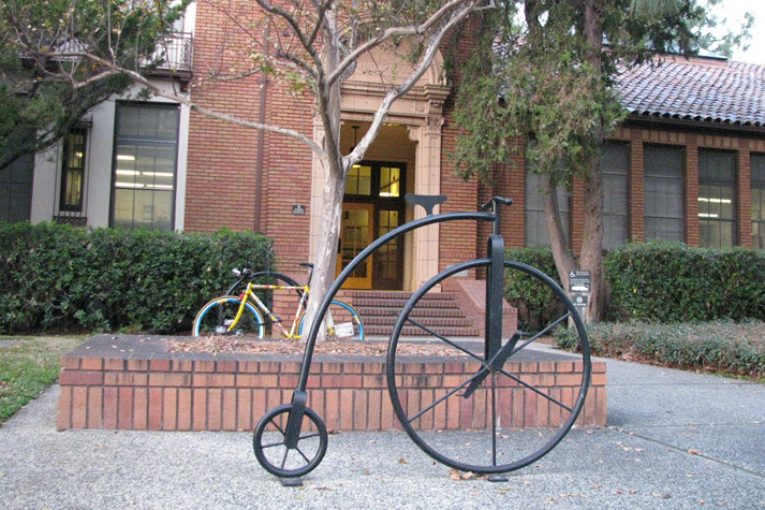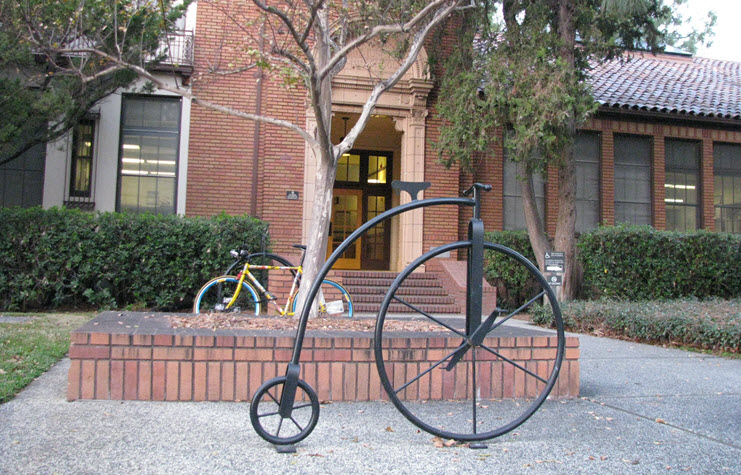

In May, there will be a special election to fill the vacancy in the 3rd District left by the departure of Lucas Frerichs to the County Board of Supervisors.
Filing to compete for that seat are two candidates: Donna Neville and Francesca Wright. Each week between now and the election, the Vanguard will pose the candidates weekly questions in which they have between 250 and 350 to respond.
Question 6: In 2012, the Studio 30 report recommended a dispersed innovation strategy. Since that time, voters in Davis voted against DISC in 2020 and 2022, they also voted down a 2016 Nishi project with an R&D component. Given that, how would you approach the city’s economic development strategy if elected?
 Francesca Wright
Francesca Wright
I have a big-C little-c approach to economic development. I will focus on increasing City revenue and enhancing city vibrancy. This will require a collaborative relationship between our public and private sectors.
Our City’s ability to maintain our existing public resources and to provide quality services requires revenue. This comes primarily from property tax, sales taxes, and hotel taxes. We need strategies to maximize these within the constraints of our community’s desire to support local business and preserve our town’s character. This will require restoring vibrant retail, attracting tourism, and facilitating ease of permitting upgrades. I will support the arts, attractive public spaces, local business, and improved customer service in our building permitting and land use planning.
Having successful local business enterprises strengthens the fabric of our community. Businesses that provide living wages and reward entrepreneurial risk will retain families and a healthy private sector to support the many non-profits which elevate the quality of life here. Some of these enterprises require dedicated physical spaces, where others are happening on laptops in homes and cafes. Both are needed.
UC Davis is producing brilliant inventors who need research and lab space, as well as startup financing. This is especially true around the elemental and critical areas of agriculture and food. We should capitalize on our excellence in those two sectors. Our art community is trying to mobilize for a major performance and exhibit space. As a City Council member, I will encourage our soon to be hired Director of Economic Development to build on the foundational work our creatives have already done. Help them solve their problems.
COVID disrupted historic notions of office space. Vacant spaces can be retooled. Start up financing may be a greater challenge than space. I would ask the new city economic development director to develop proposals to address financing challenges. I support our local climate activists who are leading a grassroots movement to utilize local banks and credit unions who invest in clean technologies. Let’s put our personal cash in these banks and credit unions and ask them to invest in our local talent.
I agree, a dispersed innovation strategy is fine. Let’s have an economic development strategy and get to work.
 Donna Neville
Donna Neville
When talking about economic development, it’s important to think beyond just revenue for the City. Revenue is critical, but economic development is also about creating local jobs for a workforce that can live and work in Davis; raise their children here, spend money here, and support our local economy. This is what will continue funding the things we care about: our parks and greenbelts, our roads and bike paths, summer camps, and much more.
Nishi 1.0 and DISC 2020 were close elections, demonstrating Davis has an appetite for economic development. DISC 2022 sent a clear message that voters still had many unresolved concerns. I believe our community knows we need economic development and wants to promote innovative businesses that will bring much needed tax revenue to our city.
First, we need to complete the hiring of our new Economic Development Director. Having the right staffing in place is essential.
Next, at the direction of the city council, the new director needs to assemble a robust economic development plan that attracts and retains the businesses we need to boost our downtown and other commercial hubs throughout the city. Without an economic development plan, we currently rely on a set of broad goals and objectives. Real progress requires more: we need a solid assessment of our current economic situation and a shared vision of what types of economic development our community wants. We also need an implementation plan with measurable goals and objectives, coupled with strong city council leadership to make that vision a reality.
The economic development plan needs to support the many talented entrepreneurs we have so that they can locate their businesses in Davis. UCD produces the future talent in fields like agtech, biotech, and food science. Companies start here and want to remain here because of the talent in our community but are often forced to relocate somewhere else because of a lack of commercial space. The City needs to collaborate with the commercial real estate community, business community, and other partners to identify suitable spaces.
With the right leadership we can be a hub of innovation.

I will refrain from directly commenting regarding the positions of these 2 candidates on Davis economic development since I have never resided in District 3. I predict that a certain someone will provide his worthless opinion on economic development in Davis despite the fact that he has never even remotely lived near this fair City.
I don’t live in San Francisco, but I care who gets elected. I think it effects us all. As far as Davis district voting I think any Davisite or any one else who cares to should weigh in. One district vote could sway the council vote to enact policies that’s not good for other districts or neighboring cities.
True – district candidates impact the entire city – including those not eligible to vote, but who have connections to the city. (Folks like Don Shor.)
Some people go so far as to suggest that those with no actual connection to the city at all (such as students living entirely on campus during their short tenure while pursuing a degree) are impacted by city decisions, as well. In fact, some go out of their way to ensure that those particular non-residents (with no connection to the city at all) are accommodated, and that the city somehow “owes” that to them.
This despite the fact that the majority of them have no plans whatsoever to remain in the area at all, let alone establish any connection to the city itself.
Let me get this straight:
First, there supposedly isn’t enough housing to attract young families here, or at least at a cheap-enough price for them to afford it. (Never mind the fact that they can do so in cities immediately surrounding Davis, though it’s not exactly cheap there, either.)
But now, this candidate is also proposing jobs for these supposedly non-existent families, thereby creating the need for more housing in the first place.
This is what we call “circular reasoning”, or more accurately – an excuse to pursue growth for growth’s sake. (Though I think we all know at this point that this is a ruse in regard to a school district which actively fights downsizing)
Translation: Look for this candidate to force a third DISC election upon the city. Presumably after the “100% Housing” DISC makes its way to the ballot. After all, those new residents will need a place to work, if the 100% Housing DISC is approved, right? (Part of that circular reasoning referred to, above.) The only difference being that this time, they’re pursuing a “housing first” type of model.
Of course, we know that the real reason for “housing first” is because the city cannot seem to shake its “addiction” to Ponzi schemes based upon continuous growth.
Cities (including Davis) are hell-bent on converting their existing commercial space to housing. Apparently, this candidate does not know the extent of the commercial market collapse.
(The other candidate on here appears to be at least slightly the lesser of two evils. Something I noticed prior to this article, as well.)
Meanwhile, cities (including Davis) are busy attempting to convert their existing commercial space for housing.
(The “other” candidate above does seem to be the lesser of two evils – for what that’s worth.)
On a related note, I recall that Ms. Neville was the chair of the city’s finance and budget commission – the same position from which Dan Carson launched his short-lived council career.
I periodically watched/listened to what both of them advocated over time (including internal concerns that they both seemed to downplay, in regard to overly-optimistic views regarding economic development).
Was wondering “who” put forth Ms. Neville’s appointment to that commission in the first place. (Was it Dan Carson?)
Well, if she does win the seat, perhaps she’ll (at least) avoid becoming an “honorary chairperson” for DISC 3 (or is it DISC 4)?
(I figure that DISC 3 is the 100% housing proposal.)
But for sure, Neville and Carson are “two peas in the same pod”, regarding optimistic views of economic development.
This question is a little unfair because the city had undertaken a comprehensive economic development strategy and nearly every aspect of it has been shot down by the voters. Much as we’d love to believe there’s another approach out there, there isn’t.
For these answers, I’d say one candidate is more idealistic and the other is more pragmatic. If this council chooses to start over on an economic development strategy, Donna Neville would already have the requisite background and would be a natural choice for a subcommittee. I sense that Francesca Wright’s priorities are elsewhere.
Seems to me that the “pragmatic” one is the candidate who isn’t hell-bent on subjecting the city to another fight.
And/or possibly listens to those who knew that there isn’t even demand for something like DISC Or took a more skeptical approach regarding cost/benefit. (I can specifically name a couple of skeptics, who also had the requisite qualifications to do so.)
And even if there was demand for it, it would lead to “justification” for even more sprawl.
There was only “one” side regarding this issue which was fighting against a “housing shortage”. And it wasn’t those who were pushing for DISC.
I don’t think the question is unfair (obviously since I posed it to the candidates). The answer could be – as much as I disagree with Ron O – we don’t need to do anything. Or it could be, as Doby and others have suggested, a new community visioning process. Or it could be as Ron G would suggest, get rid of Measure J. Or it could be wash, rinse, repeat. While I understand people’s opposition to peripheral development, at the end of the day, I happen to think the alternative could be far worse.
Just happened across the following article, which describes concern among Roseville residents regarding yet another business park in that area.
I suspect some of them are sorry that they don’t have Measure J. (Not sure if they have a voter-approved urban growth boundary, but I suspect that the proposal is within that boundary – if it exists.)
But (almost) for sure, you already know that their elected officials support this type of thing. Which again calls into question the process which leads to the “choices” that voters are presented with in the first place. (Which is also the reason that I recall voting FOR Newsom at one point, compared to the “alternative” presented. If that’s not a sign of a broken system, I don’t know what is.)
And it’s also the (obvious) reason that controls such as “Measure J” are needed. It’s unfortunate that it doesn’t exist in EVERY community (though many do have voter-approved urban limit lines, or other measures).
https://www.msn.com/en-us/money/realestate/i-m-not-excited-about-the-effects-west-roseville-residents-share-concerns-about-proposed-business-park/ar-AA198YkD?ocid=hpmsn&cvid=7a1c358e22494331b7426f2e6abebbff&ei=17
Bottom line is that the folks who oppose these types of proposals aren’t stupid – they know that the promised “benefits” won’t overcome the direct drawbacks.